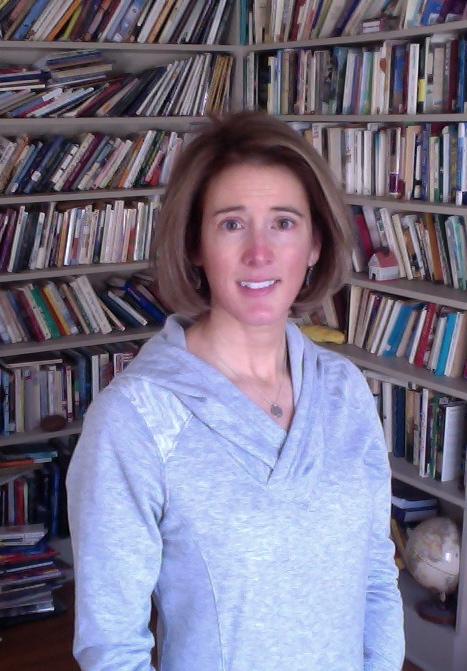Contributor Spotlight: Cindy Hunter Morgan
 Cindy Hunter Morgan’s piece “Henry Steinbrenner, 1909” appears in Midwestern Gothic Issue 13, out now.
Cindy Hunter Morgan’s piece “Henry Steinbrenner, 1909” appears in Midwestern Gothic Issue 13, out now.
How long have you been writing?
I’m not sure. A long time. I wrote poems when I was in elementary school. I also cleared out my closet and moved in a tiny table and a little chair and a lot of rocks. Some interests stick, some don’t. Poetry stuck. Maybe if I’d had a Geiger counter and a blowpipe when I was a child I’d be a geologist today…but I doubt it. I do still like rocks, though.
What’s your connection to the Midwest?
I grew up in Michigan (collecting rocks and writing poems) and though I’ve traveled widely, my roots are here. I love Michigan.
How has the Midwest influenced your writing?
Profoundly and directly. My second chapbook, Apple Season, is about my relationship with my grandma, and about my grandparents’ orchard (in Michigan) and the woods and fields around that orchard. I’m certain that place shaped me as a poet. I spent a lot of time with my grandma, but I also spent a lot of time alone, wandering in the pasture and climbing trees. Early on, I knew the pleasure of solitude. That’s important for a poet. Now I am working on a full-length collection of poems about Great Lakes shipwrecks. I’ve spent summers swimming in Lake Michigan, Lake Superior, and Lake Huron. My great-grandfather sailed the lakes on a U.S. Corps of Engineers Tug to earn money to send his daughter, my grandmother, to Michigan State College (now Michigan State University). These shipwreck poems are poems I want to write. They are of this place I love.
Why do you believe there has never really been a regionalist push for Midwestern writing in the past like there has with the South or even the West Coast?
I’m not sure I do believe that, but I’m willing to consider it. I think there has always been a strong connection between literature and identity. Conflict shapes identity. History—particularly a troubled history—is fodder for literature, and maybe it brings a kind of confidence to literature, or a kind of confidence to those who are writing…a feeling that there is a deep and significant story worth telling. And there is truth in that. There is a national awareness of the history of the South and of the West. One is associated with slavery and the Civil War, and one with expansion. These associations imbue the literature of each place with a sense of importance. The history of the Midwest is probably less known outside of the Midwest, and maybe that obscurity is sometimes confused for or aligned with insignificance. In any case, I’m really glad Midwestern Gothic is dedicated to publishing work inspired by the Midwest. There are stories here worth telling, worth hearing.
How do you feel about social media to promote your writing, and do you use it?
I think it’s just fine. Better than fine. I’m on Facebook. I like finding poems in my news feed. And I like sharing poems there too.
Favorite book?
I can’t pick just one, but that answer won’t get us anywhere, will it? In high school I read Moby Dick. Every now and then I read it again. It will always be special. In my twenties I read Ivan Doig, John McPhee, Jim Harrison, Pam Houston, Franklin Burroughs, Annie Dillard, Lewis Thomas. They were and are important to me. But specific books? James Galvin’s The Meadow, Mark Helprin’s Winter’s Tale, Wendell Berry’s The Memory of Old Jack, Tove Jansson’s The Summer Book (and her Moomin books), Italo Calvino’s The Baron in the Trees, Susanna Clarke’s Jonathan Strange & Mr Norrell. I recently finished Donna Tartt’s The Goldfinch and I just finished Rachel Kushner’s The Flame Throwers. Both are excellent. And I just discovered Austin Smith’s Almanac. I’m deeply impressed. His poems are fantastic. I’ll stop now. That was a long answer, and it’s still insufficient.
Favorite food?
This is nearly impossible to answer. I really like to eat. I can tell you what I made for lunch. A Swiss Dill sandwich: grated Swiss cheese, chopped dill pickles, and mayo…on grilled pumpernickel bread. It’s modeled after one I like to order at Jesperson’s Restaurant in Petoskey. Hemingway used to eat there. I don’t know if he ever had a Swiss Dill sandwich. I hope he did.
If you could have coffee (or tea or a beer) with any literary figure, alive or dead, who would it be?
Well that’s interesting to consider. A few figures might be too querulous. Let’s not name them. Then there are a few (Norman Maclean, for example, who happens to be dead) for whom I probably feel too much reverence. I would want only to listen. There would be too much silence and adoration on my end, which would kill the conversation. I would like to have tea with Mary Ruefle. I don’t know if Mary Ruefle likes tea, but Mary Ruefle + Alcohol might be too much. I mean this in the best possible way. So we’d have tea and make erasures and read our erasures out loud to each other and then maybe have a little more tea. I’d like to hang out with Sherman Alexie. I’d like to have a few beers with Carl Hiassen. Also, some night when sleep won’t come, I’d like Yeats to sit beside my bed and read poems to me.
Where can we find more information about you?
You can find a few poems, a music playlist for my first chapbook, and lots of pictures of snowflakes at www.cindyhuntermorgan.com.






